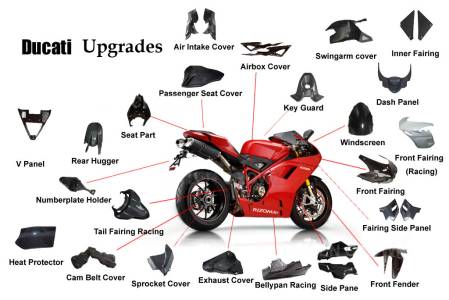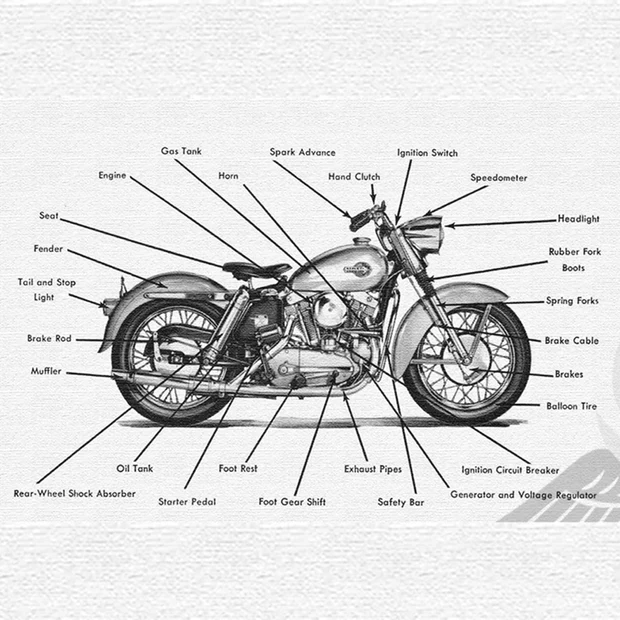Discover the Important MotorBike Parts You Required for Optimal Performance
Understanding the vital parts of a motorcycle is essential for attaining peak efficiency. Each component, from the engine to the stopping system, plays an essential duty in total capability and safety. Routine upkeep can prevent unanticipated failings and boost the riding experience. Nonetheless, numerous bikers neglect the details of these systems. Finding just how they collaborate can lead to an extra efficient adventure. What critical components should every motorcyclist focus on?
The Engine: The Heart of Your Motorcycle
The engine serves as the core component of a motorcycle, driving its performance and defining its capacities. It is responsible for converting fuel into power, which powers the bike onward. Numerous kinds of engines are used, including single-cylinder, V-twin, and inline setups, each offering unique qualities suited for different riding objectives and designs. The engine size, generally measured in cubic centimeters (cc), substantially affects efficiency, with larger engines generally offering even more power and torque.Furthermore, the engine's layout and modern technology, such as fuel injection systems or air-cooling versus liquid-cooling, impact efficiency and reliability. Upkeep is crucial for peak procedure; variables like routine oil changes and monitoring trigger connects guarantee long life. Bikers usually take into consideration an engine's responsiveness and smoothness, as these features enhance the general riding experience. Inevitably, the engine stays a vital element that specifies not just the motorbike's performance however additionally the rider's link to the machine.
The Transmission: Changing Gears Efficiently
The transmission plays a necessary role in a motorcycle's performance, specifically in the auto mechanics of equipment changing. Recognizing just how to shift gears efficiently can enhance the general riding experience, while regular upkeep warranties peak capability. Proper focus to these elements can substantially affect the long life and effectiveness of the bike.

Gear Shifting Mechanics
Smooth equipment changing is crucial for perfect motorbike performance, substantially influencing both acceleration and control. The auto mechanics of equipment changing include the communication in between the clutch, equipment lever, and transmission system. When a motorcyclist involves the clutch, it disengages the engine from the transmission, enabling an equipment adjustment without damaging the components. A well-timed release of the clutch, integrated with specific motion of the equipment lever, assists in a smooth change between gears. This process ensures that the engine operates within its ideal power band, enhancing performance. Bike Parts Wellington. Additionally, understanding the gear ratios and their result on rate and torque can assist bikers make notified options throughout changes, ultimately adding to a much more pleasurable and responsive riding experience
Maintenance Tips Value
Regular upkeep plays a crucial role in ensuring that the transmission system operates effectively, enabling for smooth gear changes. Frequently inspecting and changing the transmission fluid is vital, as old liquid can cause boosted friction and wear. In addition, inspecting the clutch for wear assurances peak involvement and disengagement, stopping slippage during gear modifications. Lubrication of moving parts is just as crucial to minimize friction and boost performance. Motorcycle owners need to likewise keep an eye on for leakages and unusual sounds, as these can indicate underlying problems. By adhering to these upkeep ideas, bikers can prolong the lifespan of their transmission system, assuring that gear changes remain smooth and adding to the overall efficiency of their motorbike.
The Braking System: Ensuring Safety And Security on Every Experience
Braking systems are fundamental parts that directly affect a motorbike's safety and efficiency. They include different parts, consisting of brake pads, rotors, calipers, and hydraulic lines, all functioning with each other to guarantee reliable deceleration. The kind of braking system-- typically either disc or drum-- impacts responsiveness and stopping power.Regular maintenance is necessary to maintain peak performance; used brake pads can cause decreased performance and enhanced quiting distances. Furthermore, the quality of brake fluid need to be kept track of, as it can soak up moisture gradually, jeopardizing braking efficiency.Riders ought to additionally consider the relevance of anti-lock braking systems (ABDOMINAL), which stop wheel lockup throughout sudden stops, improving total safety and security. Correctly working brakes are not almost stopping; they impart self-confidence in the rider, permitting much safer navigating through various surfaces. Ultimately, a reliable braking system is important for appreciating every ride with comfort.
The Suspension: Enhancing Comfort and Control
A well-functioning shock absorber significantly contributes to a motorbike's total efficiency, enhancing the performance of the stopping system. The suspension plays a considerable role in absorbing shocks from uneven surface areas, ensuring a smoother trip while maintaining tire call with the roadway. This contact is important for both security and control, enabling bikers to navigate edges with confidence and precision.Different types of shock absorber, such as telescopic forks or mono-shocks, supply varying levels of convenience and handling. Correctly tuned suspension improves responsiveness, providing the cyclist with an extra linked feel to the motorbike. Routine upkeep checks are necessary to determine the suspension parts, including springs and dampers, are functioning at their ideal. An efficient shock absorber not only elevates the riding experience however also adds to the longevity of various other motorbike components by reducing damage. Because of this, buying high quality suspension is essential for any severe motorbike lover.
The Tires: Connecting You to the Roadway
Tires play an important duty in a motorbike's efficiency, functioning as the key link in between the roadway and the biker. Recognizing the different sorts of tires readily available can significantly influence handling and security. In addition, regular maintenance is crucial to guarantee peak tire performance and durability.
Tire Keys In Explained
How do different tire types affect a motorcycle's efficiency? Tire types play a crucial role in figuring out a motorbike's security, hold, and handling. Sport tires, developed for high efficiency, deal boosted grip and responsiveness on paved roads, making them optimal for competing and hostile riding. On the other hand, exploring tires focus on durability and comfort, offering a smoother experience for long-distance traveling. Off-road tires, defined by their sturdy step patterns, succeed in grip on unpaved surface areas, appropriate for experience lovers. Furthermore, dual-sport tires mix qualities from both off-road and on-road groups, dealing with functional riding requirements. Eventually, choosing the best tire type is vital for enhancing efficiency, guaranteeing safety, and enhancing the overall riding experience.
Upkeep Tips Offered
While riding when traveling, preserving excellent tire problem is crucial for safety and efficiency. Regularly inspecting tire stress is essential, as under-inflated tires can bring about bad handling and increased wear. It is advisable to evaluate step depth frequently; worn tires compromise grip and security. Furthermore, riders need to seek indications of damages, such as cracks or lumps, which can indicate the demand for replacement. Rotating tires periodically ensures even put on, boosting durability. Maintaining tires clean from particles and preventing too much curbs can lengthen their lifespan. Maintaining appropriate alignment and balance adds to come to a head performance, lessening stress on other bike elements. Sticking to these maintenance ideas will greatly enhance the general riding experience.
The Gas System: Sustaining Performance and Efficiency
The fuel system plays a vital role in making best use of a motorbike's performance and efficiency, as it ensures the ideal distribution of gas to the engine. It comprises several vital parts, consisting of the gas container, gas pump, gas filter, and gas injectors or carburetor. Each component must function efficiently to ensure a smooth and effective ride.The gas storage tank shops fuel and provides it to the engine using the fuel pump, which generates the necessary pressure. A fuel filter prevents visit contaminants from entering the engine, while the injectors or carburetor mix gas with air for combustion.Proper upkeep of the gas system is critical; a clogged filter or malfunctioning injector can lead to decreased performance and boosted gas consumption. By verifying that the fuel system runs efficiently, bikers can enjoy better throttle response, better fuel economic climate, and overall improved riding experience.
The Electric System: Powering Your Experience
A reliable electrical system is vital for the general functionality and safety of a motorcycle, as it powers important elements such as the ignition, illumination, and various digital systems. This system consists of the battery, which stores power, and the alternator, responsible for creating power while the engine runs. The circuitry harness links these components, making certain trusted power distribution.Additionally, merges safeguard the system from overloads, while relays help manage high-current devices with low-power signals. A properly maintained electric system enhances efficiency by ensuring smooth beginnings and consistent procedure of lights and signals, vital for motorcyclist visibility and safety.Regular checks of the battery's cost and connections are necessary for preventing electrical failings. Motorcyclists need to likewise evaluate electrical wiring for damage, guaranteeing all parts work preferably. Ultimately, a durable electric system contributes substantially to the overall efficiency and integrity of the motorbike.
Often Asked Inquiries
How Usually Should I Replace My Bike's Battery?
The frequency of motorbike battery substitute relies on usage and upkeep (Oem Parts New Zealand). Generally, batteries must be changed every three to five years. Routine checks can assist recognize when a substitute is necessary for peak performance
What Tools Do I Required for Standard Motorcycle Maintenance?
For fundamental bike upkeep, one calls for important devices such as an outlet collection, wrenches, screwdrivers, pliers, tire stress scale, and a torque wrench. These devices facilitate effective upkeep and ensure the motorbike runs effectively and securely.
Just How Can I Boost My Motorcycle's Aerodynamics?
To boost motorbike the rules of aerodynamics, one ought to take into consideration readjusting fairings, making use of windshield expansions, maximizing body placement, and lowering total weight. These alterations aid decrease drag, boosting security and gas performance during rides.
What Are the Signs of a Failing Electrical System?
Signs of a failing electric system include dimming Learn More Here lights, difficulty beginning, uneven tool readings, and blown merges. Oem Parts New Zealand. Uncommon smells or corrosion around battery terminals might likewise indicate underlying issues requiring instant attention for safety and efficiency

How Do I Choose the Right Oil for My Motorcycle?
When picking oil for a bike, one must think about the producer's specifications, thickness scores, and the kind of riding. Additionally, artificial versus standard oil can affect performance and engine defense, influencing the choice significantly. The engine size, look these up generally determined in cubic centimeters (cc), significantly influences performance, with larger engines generally providing even more power and torque.Furthermore, the engine's design and modern technology, such as gas injection systems or air-cooling versus liquid-cooling, influence performance and dependability. A well-functioning suspension system significantly adds to a motorbike's overall efficiency, matching the effectiveness of the stopping system. The fuel system plays an important duty in making the most of a motorcycle's efficiency and efficiency, as it guarantees the optimum shipment of gas to the engine. A fuel filter protects against pollutants from entering the engine, while the injectors or carburetor mix fuel with air for combustion.Proper upkeep of the gas system is critical; a blocked filter or malfunctioning injector can lead to lowered efficiency and boosted gas consumption. A properly maintained electric system enhances efficiency by ensuring smooth begins and constant operation of lights and signals, essential for biker exposure and safety.Regular checks of the battery's cost and connections are crucial for protecting against electrical failures.